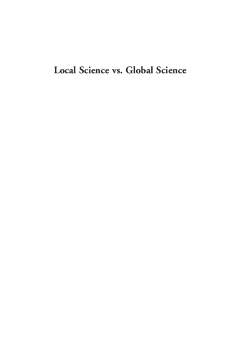
Additional Information
Book Details
Abstract
While science has achieved a remarkable understanding of nature, affording humans an astonishing technological capability, it has led, through Euro-American global domination, to the muting of other cultural views and values, even threatening their continued existence. There is a growing realization that the diversity of knowledge systems demand respect, some refer to them in a conservation idiom as alternative information banks. The scientific perspective is only one. We now have many examples of the soundness of local science and practices, some previously considered “primitive” and in need of change, but this book goes beyond demonstrating the soundness of local science and arguing for the incorporation of others’ knowledge in development, to argue that we need to look quizzically at the foundations of science itself and further challenge its hegemony, not only over local communities in Africa, Asia, the Pacific or wherever, but also the global community. The issues are large and the challenges are exciting, as addressed in this book, in a range of ethnographic and institutional contexts.
“…a fascinating and unusual effort to address audiences in both social-cultural anthropology and general science…The tone and style of writing is precise and economical while it also retains a level of detail that is ethnographically intriguing.” · American Anthropologist
"The reader will find a great number of ideas and issues to think both with and against, making this both an excellent primer and an ideal undergraduate course book, as well as being of interest to anyone already working in the area of knowledge and development." · Social Anthropology
“This collection is much more than a plea for valuing ‘indigenous’ knowledge. It is a reasoned set of arguments to value those things that cannot be measured…a rich mix of approaches developed here... an important reminder…that Western society may not prove to be the best adapted or most advance social formation in a sustainable future.” · JRAI
Paul Sillitoe is Professor of Anthropology, Durham University. His research interests focus on natural resources management, appropriate technology, and development. He specialises in social and environmental change, sustainable livelihoods, human ecology and ethno-science. He has long-standing interests in the Pacific, and more recently in South Asia. He seeks to further the incorporation of local knowledge in development, having experience with several international development agencies.
